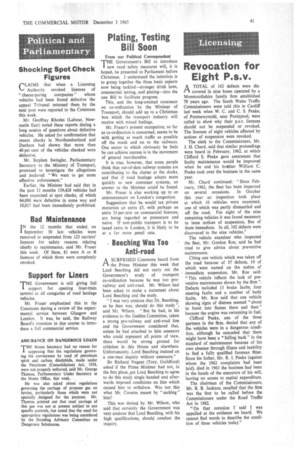Licensing
Page 43

If you've noticed an error in this article please click here to report it so we can fix it.
Revocation for Eight P.s.v.
I-1 A TOTAL of 162 defects were dis
covered in nine buses operated by a Monmouthshire family firm established 70 years ago. The South Wales Traffic Commissioners were told this in Cardiff last week when W. C. and C. S. Peake, of Pontnewynydd, near Pontypool, were called to show why their p.s.v. licences should not be suspended or revoked. The licences of eight vehicles affected by notices of suspension were revoked.
The clerk to the Commissioners, Mr. J. H. Chard, said that similar proceedings were heard in February, 1962, at which Clifford S. Peake gave assurances that faulty maintenance would be improved when he and his breither William C. Peake took over the business in the same year.
Mr. Chard continued: "Since February, 1962, the fleet has been inspected on several occasions. In October this year an inspection took place at which 10 vehicles were examined, one of which was partly dismantled and off the road. For eight of the nine remaining vehicles it was found necessary to issue notices of suspension, five of them immediate. In all, 162 defects were discovered in the nine vehicles."
The vehicle examiner who inspected the fleet, Mr. Gordon Roe, said he had tried to give advice about preventive maintenance.
Citing one vehicle which was taken off the road because of 37 defects, 19 of which were named on the notice of immediate suspension, Mr. Roe said: "This vehicle reflects the lack of preventive maintenance shown by the firm ". Defects included 13 brake faults, four steering faults and a number of body faults. Mr. Roe said that one vehicle showing signs of distress seemed "about to burst into flames there and then" because the engine was swimming in fuel.
Clifford Peake, one of the three partners in the firm, denied that any of the vehicles were in a dangerous condition, although he conceded that there might have been a "falling back" in the standard of maintenance because of his own absence through illness and inability to find a fully qualified foreman fitter. Since his father, Mr. R. I. Peake (against whom the 1962 complaints had been laid), died in 1963 the business had been in the hands of the executors of his will, leaving no access to capital expenditure.
The chairman of the Commissioners, Mr. R. R. Jackson, recalled that the firm was the first to be called before the Commissioners under the Road Traffic Act in 1962.
" On that occasion I said I was appalled at the evidence we heard. We cannot find words to describe the condition of these vehicles today."
















































































































































































